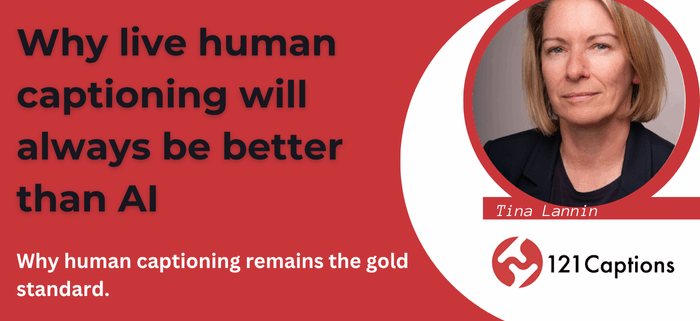Why live human captioning will always be better than AI
As artificial intelligence continues to improve, many organisations are tempted to rely on AI-generated captions for their webinars, events and corporate meetings. But while automated captioning has come a long way, it still falls short of the accuracy, nuance and reliability delivered by professional human captioners.
If you’re serious about accessibility and audience engagement, here’s why human captioning remains the gold standard.
Accuracy matters, especially at live events
AI captions might be acceptable for casual YouTube videos, but when it comes to live events, accuracy is critical. Missed words, misinterpreted jargon, or clumsy phrasing can lead to confusion, and in some cases, embarrassment.
Professional human captioners deliver:
- Correct grammar and punctuation
- Real-time editing and contextual awareness
- Accurate spelling of names, terms, and industry jargon
- Speaker differentiation and tone recognition
When you want your message to land clearly and professionally, only a skilled human can deliver that standard.
Context is everything
AI struggles with context. It can’t infer meaning from tone, body language or subtle shifts in conversation. That’s why technical terms, idioms and accents are often misrepresented in automated captions.
Human captioners, on the other hand, are trained to recognise and interpret:
- Regional accents and dialects
- Specialised vocabulary across industries
- Multi-speaker interactions and fast-paced dialogue
- Cultural nuances that AI doesn’t understand
Context-aware captioning is especially important for international audiences and diverse speaker panels, where clarity and accuracy can’t be left to chance.
Reliability in high-stakes environments
Automated systems depend on audio quality, stable internet connections and platform compatibility. When one of those fails, your captions do too.
Human captioners are trained to handle unexpected issues, from muffled audio to fast speakers. They’re also supported by tech teams who monitor sessions and can troubleshoot in real time, ensuring a seamless experience for your audience.
Inclusivity means getting it right
For deaf and hard-of-hearing attendees, poor captions aren’t just frustrating, they’re exclusionary. Captioning is an essential accessibility tool, and it must be accurate, complete and respectful.
Relying solely on AI can risk alienating the very people your accessibility efforts aim to include. Real inclusion starts with real humans who understand the responsibility and importance of their role.
The professional touch from 121 Captions
At 121 Captions, we provide expert live human captioning tailored to the unique demands of each event, whether it’s a corporate meeting, HR training, conference, or public webinar. Our captioners are not only linguistically skilled, but trained to deliver fast, precise, and professional support every time.
We also offer live captioning in over 25 languages, support across multiple platforms (Zoom, Teams, 1CapApp, and more), and the option to combine captioning with sign language interpretation for complete accessibility.
Choose accuracy. Choose inclusion. Choose 121 Captions.
Don’t compromise on quality. Whether you’re hosting a local event or a global conference, human live captioning ensures your message is heard – and understood – by everyone.
Contact 121 Captions today to book professional captioning for your next event and show your commitment to clarity, inclusivity, and excellence.



Leave a Reply
Want to join the discussion?Feel free to contribute!